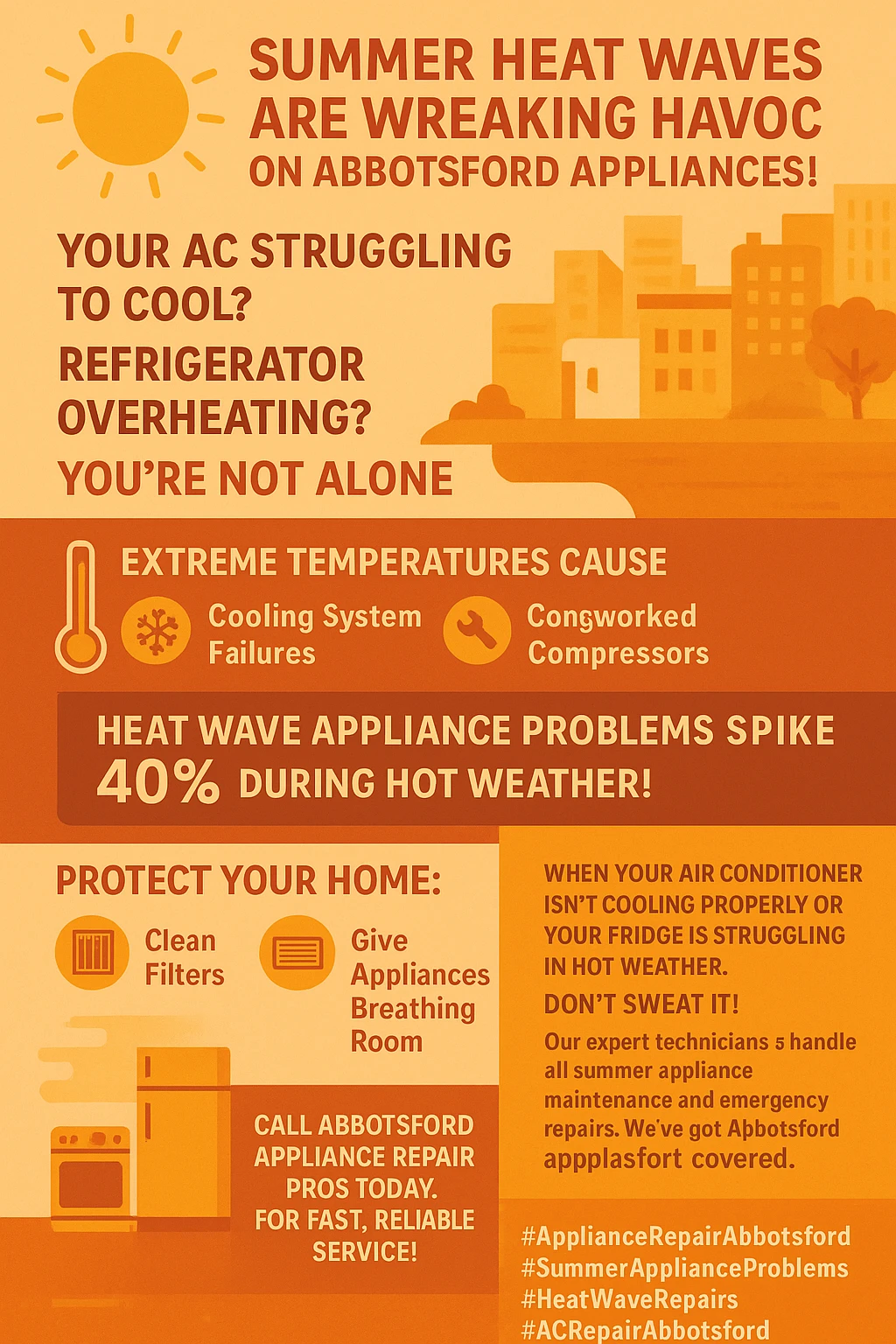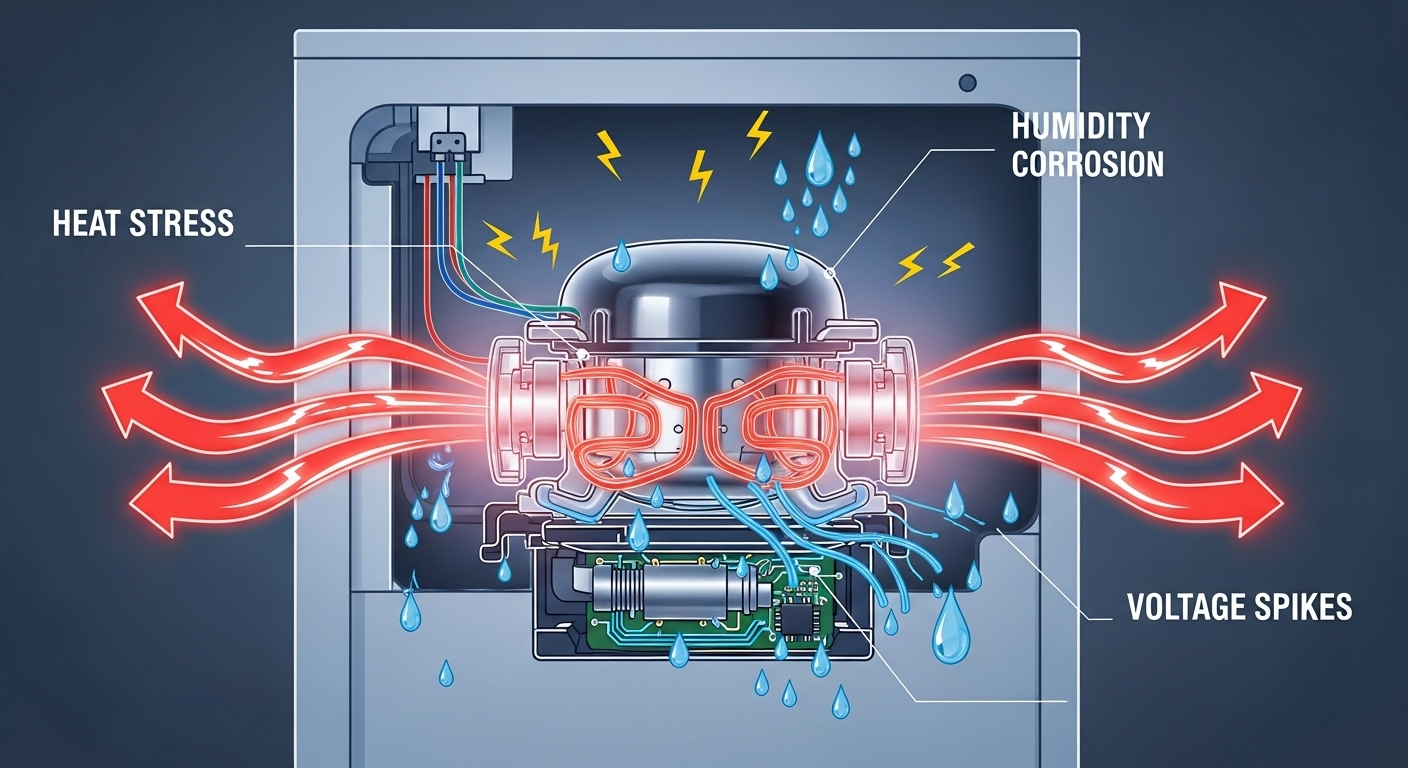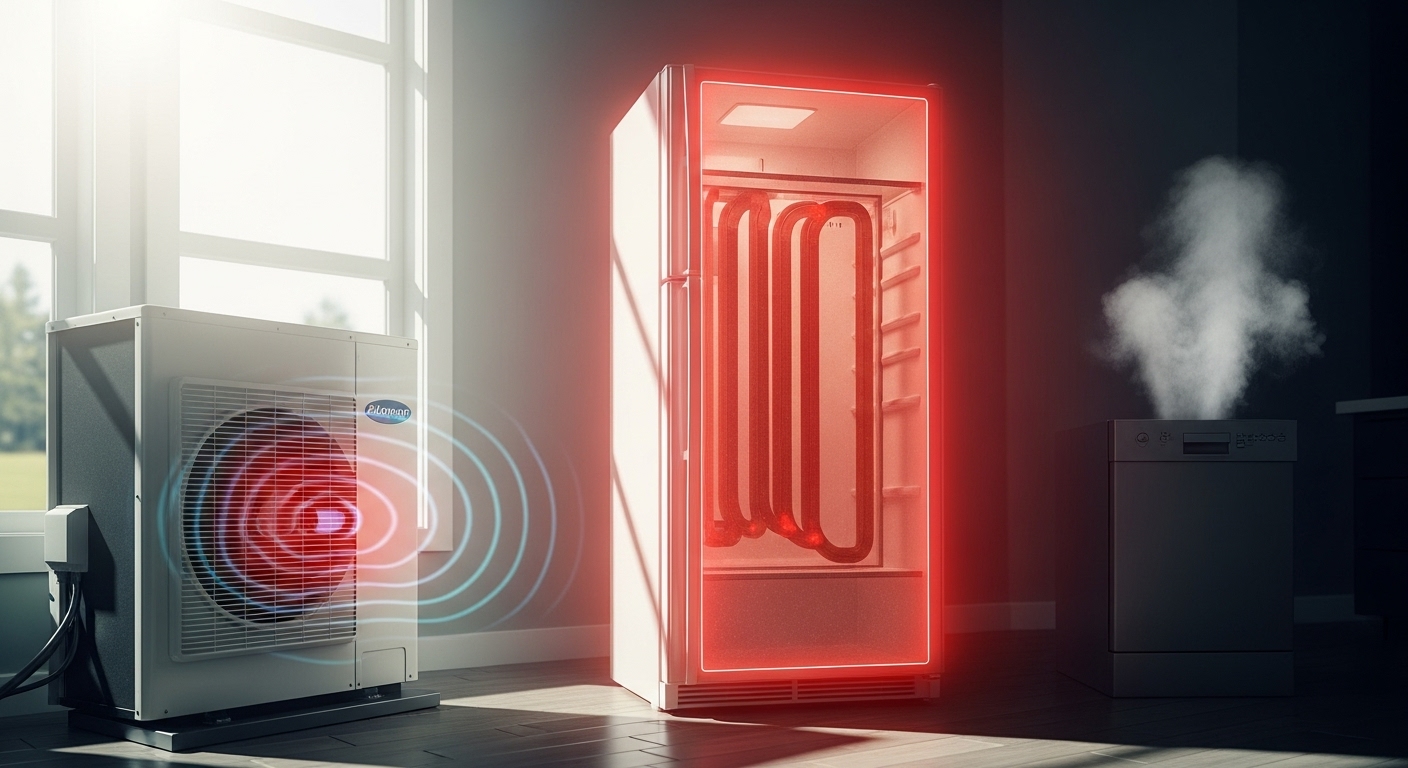Summer Heat Wave Appliance Failures: How Extreme Temperatures Are Killing Your Home Appliances and What Abbotsford Homeowners Can Do About It
Watching your fridge struggling to keep things cool while your energy bills skyrocket during Abbotsford’s summer heat waves? You’re not alone – and those warning signs might be telling you something crucial about protecting your most expensive home appliances before they fail completely.
Picture this: it’s the third day of a brutal heat wave, temperatures outside are pushing 35°C, and suddenly you notice your refrigerator running constantly while your ice cream turns to soup. Meanwhile, your air conditioner is making strange noises, and your dishwasher just gave up mid-cycle. If this scenario sounds familiar, you’ve experienced what 41% of homeowners face during extreme summer heat – the perfect storm of appliance failures that can cost thousands in emergency repairs.
What makes Abbotsford’s summer appliance failures particularly brutal isn’t just the heat itself, but our unique coastal climate that combines soaring temperatures with humidity fluctuations. Unlike the consistent dry heat of interior BC, our appliances face constant temperature swings that can reach 13 degrees in a single day, causing seals to crack, connections to loosen, and electrical components to work overtime just to maintain basic functions.
The financial impact is staggering when you consider that emergency appliance repairs during peak summer season cost between $300-500, while preventive maintenance requires less than $50 in supplies. Understanding why extreme temperatures wreak such havoc on your home appliances – and more importantly, what you can do to prevent it – could save you from joining the thousands of homeowners who face costly emergency repairs during the hottest days of the year.
Key Outtakes:
- Summer heat waves force appliances to consume up to 50% more energy while dramatically reducing their operational lifespan and efficiency
- Refrigerators experience peak failure rates during July, with 17% of homeowners reporting ice and water dispenser malfunctions during extreme heat periods
- Preventive summer maintenance can prevent 80% of heat-related appliance breakdowns and extend equipment lifespan by up to 40%
- Emergency appliance repairs during summer peak season cost $300-500 compared to under $50 for preventive maintenance supplies
- HVAC systems face the highest failure risk during heat waves, with 42% of homeowners experiencing cooling system problems when temperatures exceed normal ranges

Why Summer Heat Waves Are Particularly Devastating for Appliances in Abbotsford
Living in Abbotsford means dealing with appliance challenges that homeowners in Calgary or Winnipeg simply don’t face, and it’s not just about the temperature readings on your thermostat. Our coastal climate creates a perfect storm of conditions that systematically attack your appliances from multiple angles, weakening them throughout the year and setting them up for catastrophic summer failures. The combination of winter freeze-thaw cycles followed by humid summer heat creates stress patterns that push residential appliances far beyond their design limits.

Those winter temperature swings we experience – sometimes fluctuating 13 degrees in a single day – cause appliance components to constantly expand and contract, creating microscopic cracks in seals and loosening electrical connections. When summer heat waves arrive, these already-weakened components face their ultimate test. Your refrigerator’s rubber door seals, already compromised by months of expansion cycles, suddenly can’t maintain proper insulation when ambient temperatures soar above 30°C.
The humidity factor adds another devastating layer to appliance stress that interior regions don’t experience. When coastal moisture meets the extreme heat radiating from overworked appliances, condensation forms in electrical panels, circuit boards, and control systems. This moisture infiltration doesn’t just cause immediate failures – it creates ongoing corrosion that accelerates component degradation throughout the summer months.
Data from the UK shows energy usage increases by 7.5% during hot months, primarily from cooling demands, and this surge creates power grid strain that manifests as voltage fluctuations in your home’s electrical system. These power fluctuations, combined with appliances already working at maximum capacity, create conditions ripe for control board failures and motor burnouts. Research indicates that data centers experience 20-30% jumps in cooling energy consumption during peak summer, demonstrating the broader infrastructure strain that affects residential electrical systems.
The economic pressure on households intensifies these problems because many families delay necessary maintenance to save money, not realizing they’re setting themselves up for much larger expenses. Studies show that lower-income households experience 56% higher rates of heat-related home damage, often because they can’t afford the preventive maintenance that would protect their appliances during extreme weather events. When you consider that the average British household spends £300 every summer on emergency cooling solutions, the financial impact becomes clear – reactive approaches cost significantly more than proactive maintenance strategies.
The Most Vulnerable Appliances During Abbotsford Heat Waves
Understanding which appliances face the greatest risk during summer heat waves helps prioritize your maintenance efforts and budget planning for potential repairs. Not all appliances respond equally to extreme temperatures, and knowing the most vulnerable systems allows you to focus protective measures where they’ll have the most impact. The data reveals clear patterns about which household appliances consistently fail during heat stress conditions.

Refrigerators and freezers top the list of heat wave casualties, and the physics behind their vulnerability explains why July consistently sees peak repair demands. For every single degree Fahrenheit increase in ambient temperature, your refrigerator consumes 2-2.5% more energy, which translates to a staggering 45-50% increase in power consumption when room temperatures reach 90°F compared to comfortable 70°F conditions. This dramatic energy increase doesn’t just affect your electricity bill – it places enormous stress on compressor motors that weren’t designed for continuous high-demand operation.
The failure patterns tell a compelling story about heat stress impacts. Seventeen percent of homeowners report ice and water dispenser failures during heat waves, while 13% experience complete ice maker malfunctions. These aren’t coincidental breakdowns – they’re systematic failures that occur when cooling systems can no longer maintain consistent internal temperatures despite running continuously. When your refrigerator is located in a room where temperatures exceed 90 degrees, combined with frequent door openings during summer entertaining, the cooling system simply cannot keep up with heat infiltration.
HVAC systems represent the second major category of heat wave failures, with 42% of homeowners experiencing cooling system issues during extreme temperature periods. The irony is devastating – the systems you depend on most during heat waves are also most likely to fail exactly when you need them. Peak demand periods force these systems into continuous operation cycles they weren’t designed to sustain, leading to refrigerant leaks as components expand and contract rapidly under thermal stress.
Kitchen and laundry appliances face their own heat-related challenges that often go unrecognized until failure occurs. Heat causes expansion and contraction of rubber seals and hoses in washing machines and dryers, creating slow leaks that worsen over time until catastrophic failures occur during peak usage periods. Dishwashers experience an 11% failure rate for cleaning problems and 9% for drying issues when ambient temperatures rise, while ovens and ranges see 6% failure rates for temperature regulation malfunctions.
The timing of these failures isn’t random – it’s directly correlated with sustained periods of high ambient temperatures combined with increased usage patterns typical of summer months. Families running air conditioning constantly while simultaneously operating multiple heat-generating appliances create compound stress conditions that push electrical systems and mechanical components beyond their operational limits. Research data confirms that appliance breakdowns cluster during peak summer months, with emergency repair calls spiking dramatically when temperatures remain elevated for consecutive days.
Warning Signs Your Appliances Are Struggling with Extreme Heat

Recognizing the early warning signs of heat stress in your appliances can mean the difference between a minor repair and complete system replacement, especially during Abbotsford’s intense summer weather patterns. Most appliances don’t fail suddenly – they provide clear signals that they’re struggling with temperature stress, giving observant homeowners opportunities to intervene before costly breakdowns occur. Learning to interpret these distress signals helps you prioritize maintenance efforts and make informed decisions about repair versus replacement timing.
Your refrigerator provides some of the most obvious heat stress indicators, starting with compressor behavior that changes dramatically when ambient temperatures rise. A healthy refrigerator compressor should cycle on and off regularly, but heat-stressed units run continuously while making unusual grinding, clicking, or humming no